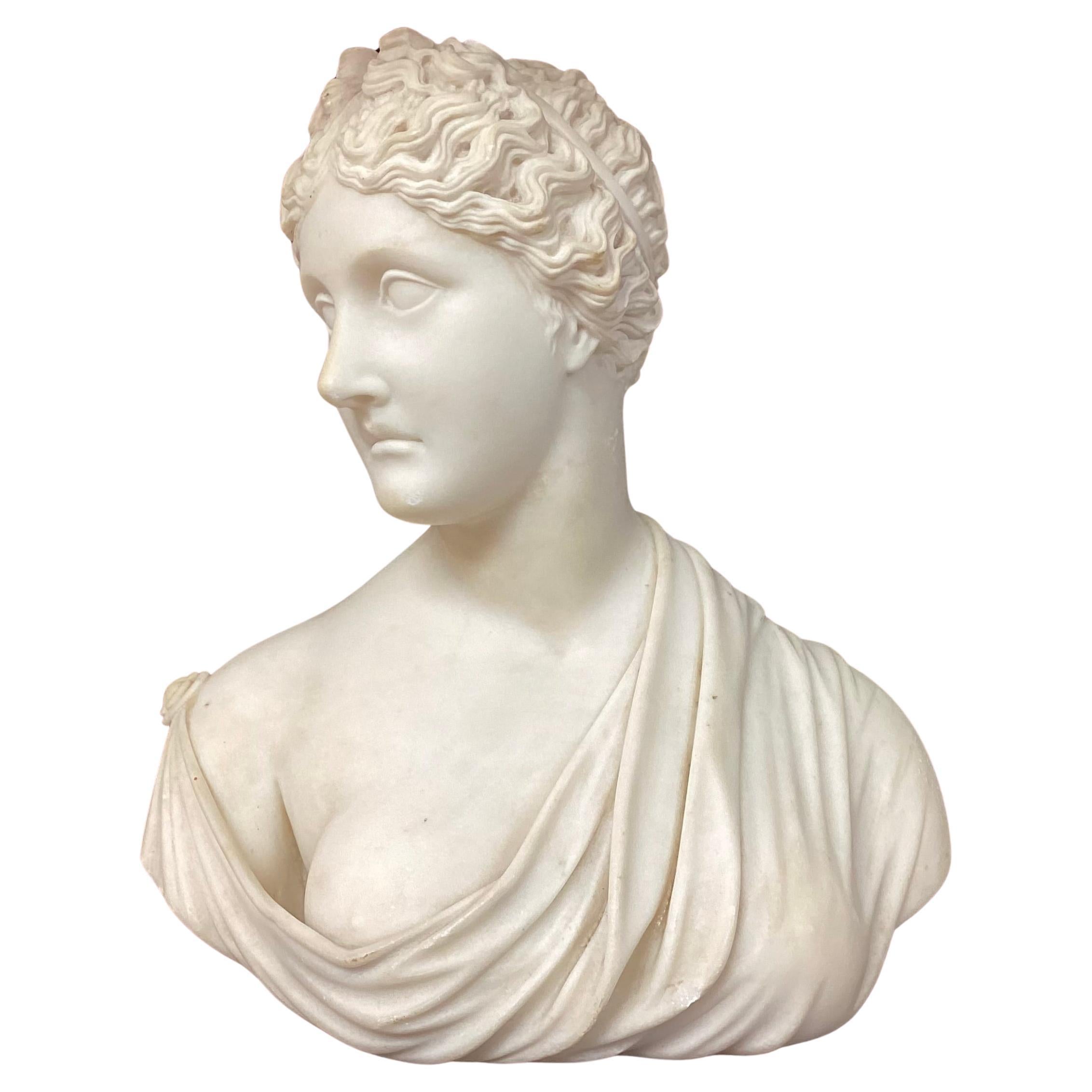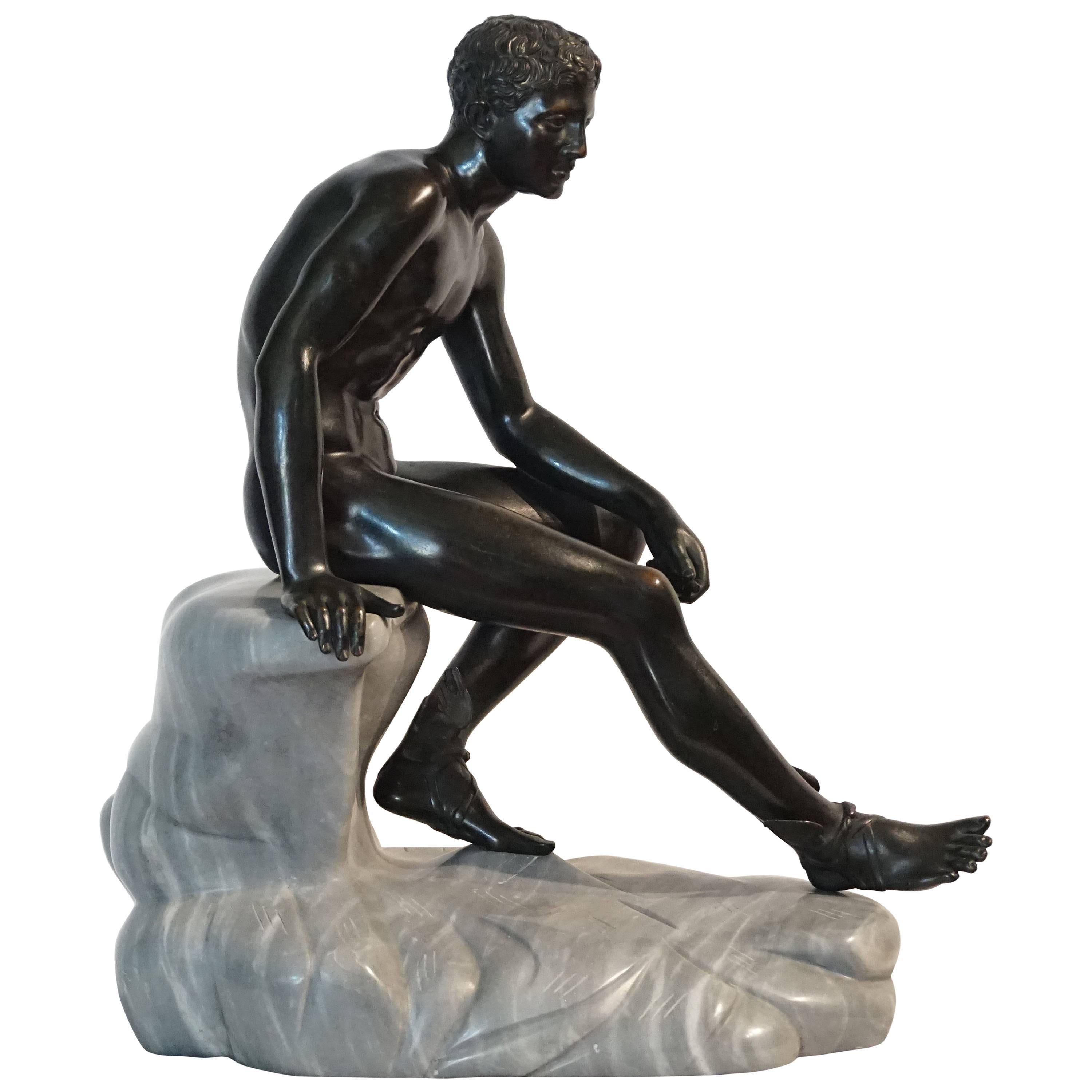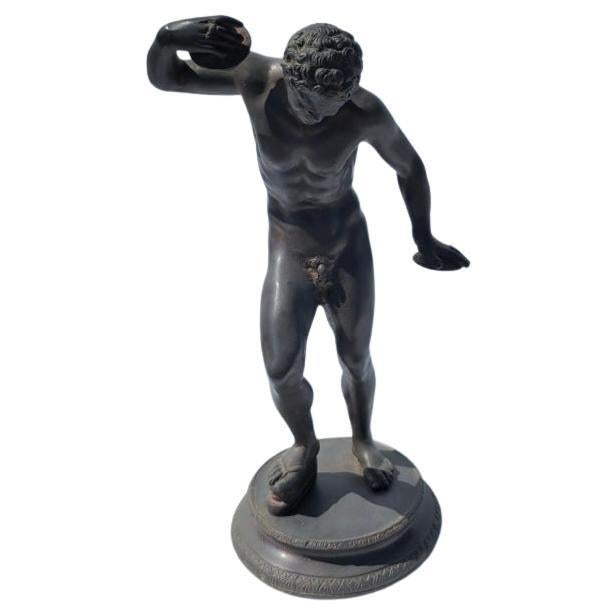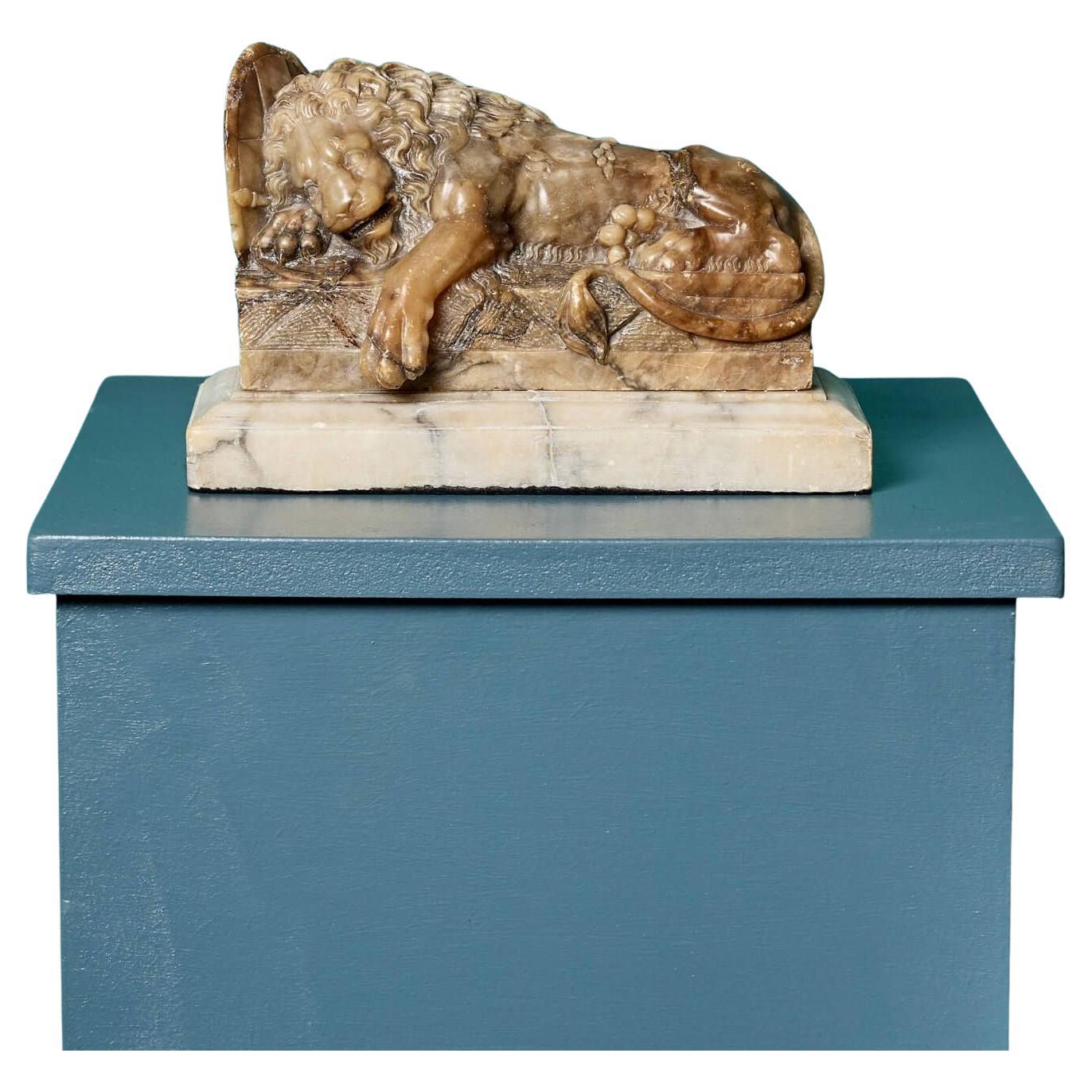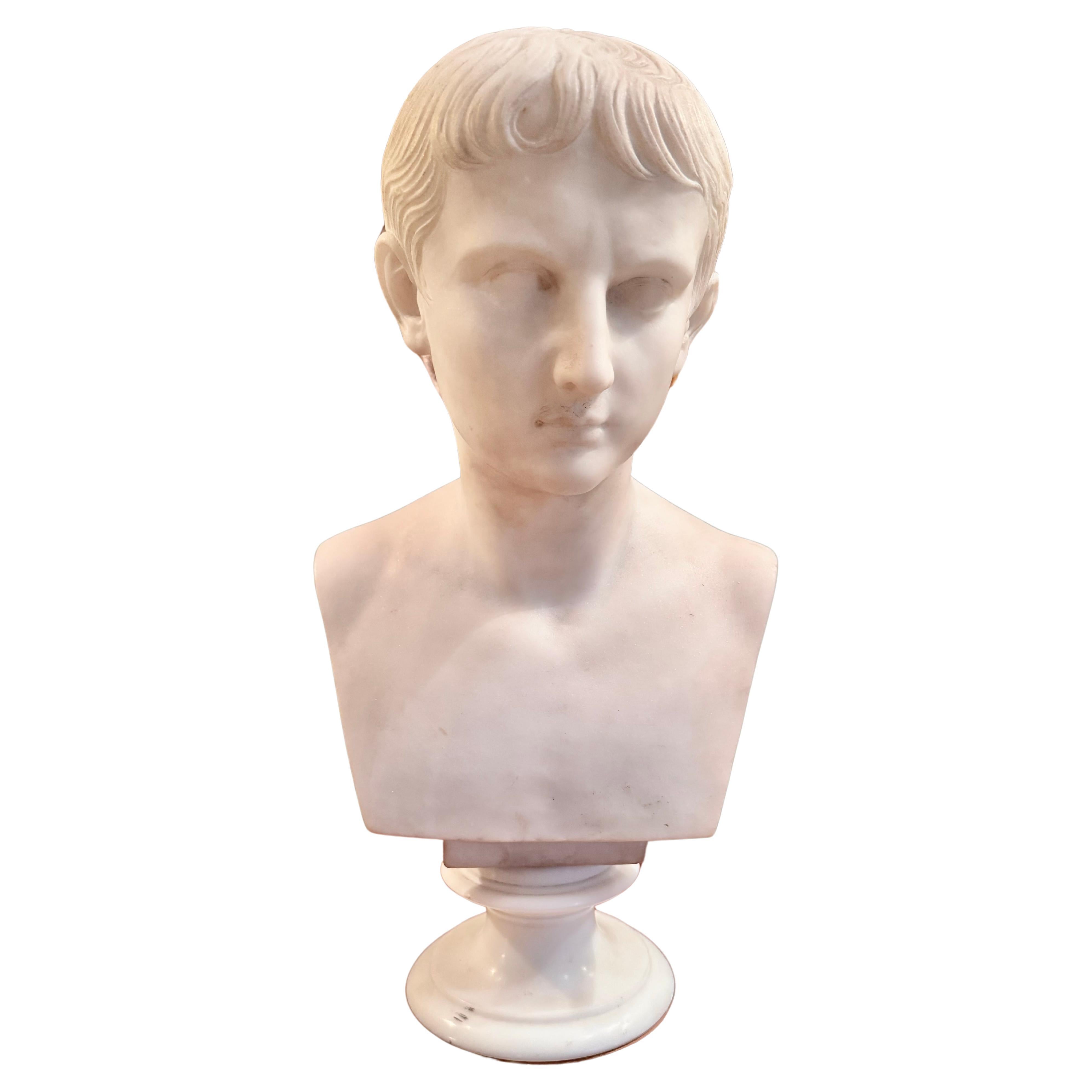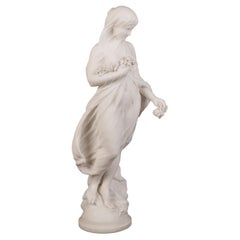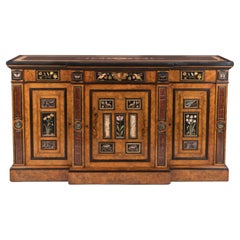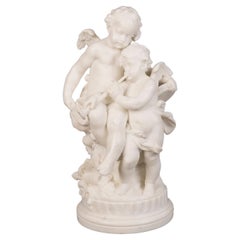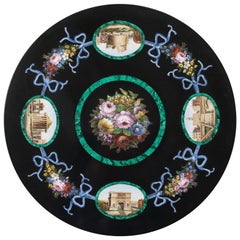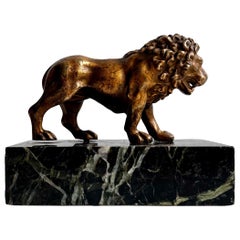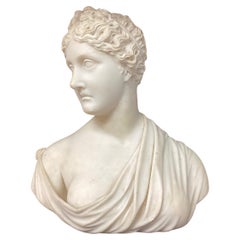Items Similar to Very Rare Italian Grand Tour Marble Sculpture of the Eros Di Centocelle
Want more images or videos?
Request additional images or videos from the seller
1 of 10
Very Rare Italian Grand Tour Marble Sculpture of the Eros Di Centocelle
About the Item
A remarkable grand tour marble sculpture of the
eros di Centocelle
The god of love carved from a block of statuary marble, raised on a bleu turquin plinth and scagliola painted pedestal.
Italian, circa 1800
Dimensions: H (torso): 35 in / 89 cm H (overall): 68 in / 172 cm
Our magnificent torso, the "Eros di Centocelle"- is an accurate model of the marble excavated in Centocelle, on the Via Labicana, not far from Rome, by the Scottish neoclassical painter and archaeologist Gavin Hamilton in 1772. Born in 1723, Hamilton travelled to Italy on his Grand Tour in 1744 and then back to Britain, finally returning to Rome in 1756, where he remained until his death in 1798.
As a painter of neoclassical subjects in Rome, he was highly regarded by Winckelmann, Goethe and by the young Antonio Canova. He worked closely with Piranesi.
As an archaeologist, he excavated at Hadrian's Villa in Tivoli in 1771 and in the following years the outskirts of Rome at Tor Colombaro, Albano, Centocelle, Ostia and so on.
As an art dealer, Gavin Hamilton sold antiquities as well as marble models of ancient subjects to British clients such as Charles Townley, William Petty and most notably sold the Warwick Vase, excavated at Tivoli, to Sir William Hamilton.
In 1785 Gavin Hamilton bought and sent to London to be sold - Leonardo's "Virgin of the Rocks", now at the National Gallery.
The Eros di Centocelle was found as represented in our model, without forearms, legs and genitals (later reattached together with the nose). There were probably wings, lost in the excavation - as holes in the back of the original suggest. Briefly at the Louvre between 1797 and 1800, as part of a group of works of art given by Pope Pious VI to Napoleon, the marble was finally returned to Rome to the Musei Vaticani where it is today, in the Pius-Clementin Museum, Galleria delle Statue, 250.
It is by repute one of several Roman versions of a bronze sculpture of the Eros of Thespiae, complete with wings, legs and arms, bow and arrow, by the foremost Greek sculptor Praxiteles of Athens, 4th century BC, that was present in Rome as described by Pliny in the first century CE -and since lost; other Roman and Hellenistic examples are known, including one at the Museo Archeologico Nazionale di Napoli known as the "Eros Farnese" and one at the Hermitage, formerly at Pavlovsk, both retaining more of the complete human figure.
Our "Eros" was most probably expertly carved shortly after the return of the original "Centocelle" to Rome from Paris in 1800: of the same approximate size and posture - it is accurate and intriguing, in it's intense expression and calm elegance.
Brought back to Britain in the 19th century most probably as a prize of the Grand Tour, it has since been in private collections.
- Dimensions:Height: 35 in (88.9 cm)Width: 16.5 in (41.91 cm)Depth: 13 in (33.02 cm)
- Style:Grand Tour (Of the Period)
- Materials and Techniques:
- Place of Origin:
- Period:
- Date of Manufacture:circa 1800
- Condition:Repaired: Each item has undergone careful inspection and restoration by a conservation specialist in order to guarantee the original quality and integrity of the object. Wear consistent with age and use.
- Seller Location:London, GB
- Reference Number:Seller: 97091stDibs: LU954731151212
About the Seller
5.0
Recognized Seller
These prestigious sellers are industry leaders and represent the highest echelon for item quality and design.
Platinum Seller
Premium sellers with a 4.7+ rating and 24-hour response times
Established in 1964
1stDibs seller since 2012
52 sales on 1stDibs
Typical response time: 2 hours
Associations
The British Antique Dealers' AssociationLAPADA - The Association of Arts & Antiques Dealers
- ShippingRetrieving quote...Shipping from: London, United Kingdom
- Return Policy
Authenticity Guarantee
In the unlikely event there’s an issue with an item’s authenticity, contact us within 1 year for a full refund. DetailsMoney-Back Guarantee
If your item is not as described, is damaged in transit, or does not arrive, contact us within 7 days for a full refund. Details24-Hour Cancellation
You have a 24-hour grace period in which to reconsider your purchase, with no questions asked.Vetted Professional Sellers
Our world-class sellers must adhere to strict standards for service and quality, maintaining the integrity of our listings.Price-Match Guarantee
If you find that a seller listed the same item for a lower price elsewhere, we’ll match it.Trusted Global Delivery
Our best-in-class carrier network provides specialized shipping options worldwide, including custom delivery.More From This Seller
View All19th Century Italian Marble Sculpture of the Goddess Flora by Ernesto Gazzeri
Located in London, GB
A Marble Sculpture of Flora
By Ernesto Gazzeri
Carved from statuary marble, the veiled maiden standing on a rocky outcrop on a circular base, her flowing dress billowing in the wind as she holds a bunch of flowers in her right arm; her eyes downcast at the single flower in her left hand. Signed to the base "E. Gazzeri / Studio O Andreoni Roma."
Italian, circa 1900
Dimensions: H: 36 in / 91.5 cm W: 13.5 in / 34 cm D: 8 in / 20 cm
The subject of the veiled maiden was first introduced in the mid-19th century by Raffaelle Monti for the Duke of Devonshire, also exhibiting at the Great Exhibition of 1851. The choice of a veiled figure continued a trend for sculptors like Ernesto Gazzeri to depict flowing fabrics in marble form, a revival of a practice used by ancient sculptors...
Category
Antique 19th Century Italian Figurative Sculptures
Materials
Carrara Marble
Rare English 'Grand Tour' Cabinet with 18th Century Italian Pietra Dura Panels
Located in London, GB
A Rare English 'Grand Tour' Cabinet
with Florentine Pietra Dura Panels
The 19th century black marble top inlaid with a central cartouche of Sicilian Jasper surrounded by Brocatelle...
Category
Antique 19th Century English Grand Tour Cabinets
Materials
Marble
19th Century, Italian Carrara Marble Sculpture of Two Putti Cupid & Erato
Located in London, GB
Allegories of the Greek Gods Eros & Erato
An Italian Carved Sculptural Group
Carved from a single block of Carrara marble, the winged putti cavorting together, one playing a trum...
Category
Early 20th Century Italian Figurative Sculptures
Materials
Carrara Marble
19th Century Micromosaic Table Top with Views of Rome from the Grand Tour
Located in London, GB
A grand tour circular table top
Possibly by Domenico Moglia
The circular platform of marmore nero, inset with fine micromosaic panels consisting of hundreds of coloured glass tesserae; a central flower bouquet sit within a malachite border surrounded by a border including four cartouches in conforming malachite reserves representing Roman views including the Arch of Titus, the Temple of Vesta, the Capitoline Hill, and the Tomb of Cecilia Metella, connected by floral garlands.
Italy, circa 1855
Domenico Moglia (1780 - 1862)
Brothers, Luigi and Domenico Moglia, are celebrated as two of the few great mosaicists of the 19th century. Both are recorded as exhibiting at the 1851 Great Exhibition, London. Domenico's work included micromosaics plaques depicting views of 'the roman forum', 'the colosseum', and the 'temples of Paestum.'
The Lombardi Museum contains a collection of architectural...
Category
Antique 19th Century Italian Grand Tour Tables
Materials
Malachite, Marble
19th Century 'Grand Tour' Marble Top Table with Base attributed to Trotter
By William Trotter
Located in London, GB
An Impressive 'Grand Tour' Specimen Marble Top Centre Table
The base attributed to William Trotter of Edinburgh
Constructed in a finely patinated mahogany, with a Florentine Pietra ...
Category
Antique 19th Century Italian Grand Tour Center Tables
Materials
Agate, Lapis Lazuli, Malachite, Marble, Breccia Marble, Porphyry
19th Century Italian Micro-Mosaic Grand Tour Table Attributed to Roccheggiani
By Cesare Roccheggiani
Located in London, GB
A rare grand tour table
Possibly by Cesare Roccheggiani
The circular platform of marmore nero, inset with fine micromosaic panels consisting of thousands of coloured glass tesserae; a central roundel depicting The Vatican from St Peter's Square within a malachite border, surrounded by a border including four cartouches in polychrome reserves of Roman views including the Coliseum, the Roman Forum, with the remnants of the Temple of Vespasian; the Temple of Vesta, and the Pantheon, all interspersed and linked by voluminous bouquets of fruit and flowers representing the 4 seasons; the outer stylised border inlaid with deep blue tesserae evocative of exotic Lapis Lazuli. Supported on a finely carved Italian giltwood base, its design incorporating baskets of fruit and floral garlands echoing the 4 seasons theme of the table.
Italian, Circa 1875
Other table tops inspired by this design, although not as finely executed, can be found in several Russian collections (which house the greatest micromosaics) including Vorontsov Palace, Muranovo House, as well as the imperial State Hermitage Museum. A tabletop with profuse floral micromosaic work was commissioned by the Belgian Royal family (sold Sotheby's, 2003).
The floral garlands, the magnificent quality of the inlay and the use of distinct curved tesserae support the present attribution to Cesare Roccheggiani. According to Jeanette Hanisee Gabriel, the world expert on micro mosaics, curved tesserae pieces were used in foliage, grass and animal fur by only the very best mosaicists such as Roccheggiani. Evidence of curved pieces, for instance, is observed in the foreground of the Temple of Vesta cartouche, to name but one observation of the master's hand.
The scion of a dynasty of mosaicists, Roccheggiani was perhaps the most successful mosaicist in the last quarter of the nineteenth century. He is doubtless related to Lorenzo Roccheggiani, a late eighteenth-century master mosaicist at the Vatican, whose work included the altarpiece, Crucifixion of St. Peter after Guido Reni. Nicolo Roccheggiani, possibly Lorenzo's son, was also a principle artist at the Vatican, involved in executing the famous tabletop Achilles Shield...
Category
Antique 19th Century Italian Grand Tour Center Tables
Materials
Malachite, Marble, Belgian Black Marble
You May Also Like
Grand Tour Sculpture of a Lion on Marble Base
Located in Philadelphia, PA
Grand Tour Sculpture of a Lion on Marble Base
"can also be used as a paperweight"
"nice patina"
"some small chips and imperfections to base and lion"
Category
Mid-20th Century American Grand Tour Animal Sculptures
Materials
Marble, Metal
Italian Grand Tour Carved Marble Bust Of Woman
Located in Bradenton, FL
Classical 19th century hand-carved Italian Neoclassic Grand Tour marble female bust. Bust features intricately carved young woman's head and neck, wearing delicate drapery across déc...
Category
Antique 19th Century Italian Grand Tour Busts
Materials
Marble
Grand Tour Bronze and Marble Sculpture of the 'Seated Hermes' or Mercury
By Fonderia Chiurazzi
Located in Kinderhook, NY
A large and exceptional late 19th century Italian Grand Tour sculpture of the ‘Seated Hermes’ attributed to the Chiurazzi Foundry, Naples, Italy. The sol...
Category
Antique Late 19th Century Italian Grand Tour Figurative Sculptures
Materials
Marble, Bronze
Italian Grand Tour Bronze Sculpture of The Dancing Satyr With Cymbals
Located in Bradenton, FL
19th Century Grand Tour Bronze Sculpture of The Dancing Satyr With Cymbals. Satyrs are roguish figures from ancient mythology known for their love of wine, music, and mischief. This ...
Category
Antique 19th Century Italian Grand Tour Figurative Sculptures
Materials
Bronze
Antique Italian Grand Tour Sculpture of Lion of Lucerne
Located in Wormelow, Herefordshire
An antique Italian Grand Tour sculpture after the Lion of Lucerne.
Dating to circa 1830, this period model is thought to have been made as a souvenir or a sample of the work by scul...
Category
Antique Early 19th Century Italian Grand Tour Animal Sculptures
Materials
Alabaster
Italian Grand Tour White Marble Bust of Augustus Caesar
Located in Bradenton, FL
19th century Italian Grand Tour white marble bust of Augustus Caesar. Bust sits on a round white marble pedestal base. Augustus was Julius Caesar's great-nephew, and the first Roman ...
Category
Antique 19th Century Italian Grand Tour Busts
Materials
Marble
Recently Viewed
View AllMore Ways To Browse
Rare Bust
Rare Italian Marble
Greek God Sculpture
Marble Wings
Torso Bust
Sculpture Pope
Antique Furniture Hamilton Furniture
Grand Tour Bronze Roman
19th Century Italian Grand Tour Bronze Sculpture
Italian Carved Marble Neoclassical Sculpture
Ancient Greek Marble Statue
Bronze Arrow Sculpture
Hand Of God Statue
Leonardo Collection
Italian Bronze And Marble Pedestal
Pope Pius
Roman Torso
4th Century Bc

